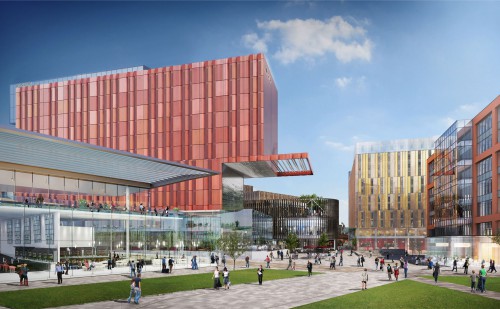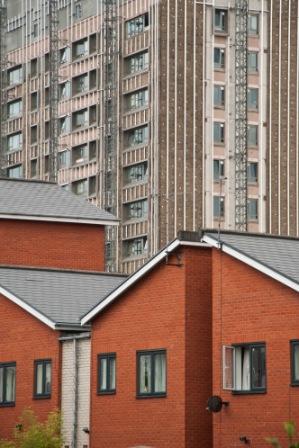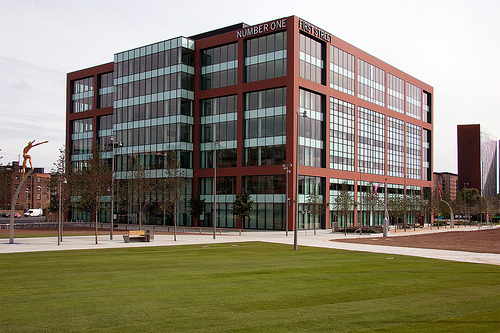Who benefits from First Street’s regeneration?
Article published: Monday, August 20th 2012
Ask Developments, in partnership with Manchester City Council, aim to develop a 20 acre site surrounding Number One First Street, located in one of the quieter patches of the city centre opposite the former Haçienda. Their vision is to create a neighbourhood with a “compelling blend of culture, leisure, retail and office space” to attract investment at a time of economic uncertainty.
The £80 million development will see the International Hotel chain Melia Hotels invest £25m in the site, along with the newly-merged Cornerhouse and Library Theatre Company, a supermarket, a 700-space multi-storey car park, a budget hotel, offices, commercial units and student accommodation.
Recently, the council called for an extra £5m in lottery funding to top up the £19m of its own money it has ploughed into the project, in addition to a further £2.5m in public funding for the incorporation of four viaduct arches onto the site.
The development was first endorsed by the Council in 2005. The economic crisis that has followed in subsequent years has slowed progress, but with economic recovery such as pressing issue Ask claims to have stepped in to accelerate the “regeneration” of Manchester’s city centre. In their own words the company, who completed an undisclosed refinancing deal with the Co-op earlier this month despite reporting a £18.1m loss last year, see themselves as “fundamental to the future of the economy of the City Region.”
With work on the project to start in January, completion is expected by June 2014. There is, however, concern that the council’s money could be better spent. With a need for affordable housing and concern for surrounding local businesses, investment in the likes of hotels, student accommodation and superstores are not welcomed by all.
Housing crisis
The council’s huge £19m investment of public money into a commercial-led development comes at a time when the region is in the grip of a housing crisis and undergoing an unprecedented £170m service cuts, with further cuts to housing benefit and council tax benefit on the horizon.
In 2012 an inquiry by the campaign body Housing Voice reported “a huge affordability gap between average house prices”, which across the North West, North East and Yorkshire were “a huge eight times higher than average earnings”. The inquiry’s chair Lord Whitty pointed out that “new home delivery is well short of this region’s growth in new households”.
With ongoing news of the housing crisis in Manchester and elsewhere throughout the UK, the council’s priorities should be brought into question.
The city’s own 2011 Retail and Regeneration Impact Study recognised “the need to ensure a provision of housing choice including…affordable housing” within its redevelopment projects.
It goes on: “A number of the sites have the potential to deliver housing development as part of a mix of uses including First Street, Crowngate, the BBC and Boddingtons specifically, although it is understood that the developers of First Street are likely to seek permission for student accommodation”. Indeed, the First Street plans contain no provision for affordable housing, instead choosing to develop such lucrative student accommodation.
Property speculation
A student strategy report that underpins the proposed residencies for the First Street site shows a rise in student numbers and therefore an increased demand for accommodation. This study dates from 2009 however, and ignores the rise in tuition fees and the economic recessions that have subsequently lowered university intakes.
Figures released this year revealed a nationwide increase in stay-at-home students since the tuition fee rise, as well as fewer applications altogether, with the University of Manchester experiencing a 10 per cent decrease in applicants. In a stark contrast, the 2011 social housing waiting list in Greater Manchester totals 101,004 households, clearly an existing need that is not being met.
As a private development agency, Ask has no obligation to incorporate affordable housing in its “master plan” for the area; the emphasis instead is on more economically satisfying student residences. With considerable funds for the project coming from the council however, speculating in commercial property in place of supporting affordable housing looks like an issue of neglect.
Stalled confidence
Last month the housing charity Shelter urged the government “to make good on its promises, in particular to ‘get Britain building’, to provide much-needed homes for thousands of families, as well as delivering new jobs and economic growth.” An understandable plea, when homelessness in the UK has increased by 14 per cent in just one year.
Is the First Street development likely to provide for these needs? Certainly they cite their work as important in a climate of economic instability, “stimulating investment and development activity”. The project also claims it will provide “a platform to unlock an estimated 11,000 jobs within the overall First Street scheme.”
Whether this claim can be realised is hard to predict. If these figures are based on the site being used to full capacity, then this may be an overambitious estimate.
Reports show that Ask Developments have reined in plans for “scores of apartments and prime office buildings” to replace them with cheaper city blocks, with a “30 per cent discount to current prime rates”. The scheme’s more affordable relaunch and site expansion may be an attempt to cast their net further; an indication that Ask are not as confident as they were in 2008 about potential investors in the site.
Yet another supermarket
A 70,000 sq ft supermarket is also to be included in the development, a noteworthy example of the issues surrounding plans for the site. One city centre resident objected to the plans, arguing that “a supermarket- led regeneration project isn’t likely to have our city’s best interests at heart, and their unaccountability and profit driven ethos is not likely to put people first.
“It makes you wonder whether ‘democracy’ is working when corporations are increasingly taking over the supposed functions of local authorities and government.”
A campaigner echoed these concerns. Sarah Shaw told Mule that for her, the point is not which superstore it might be, but a wider issue of public space, “I don’t see why we need yet another supermarket in the area, there’s already one every few metres as you walk down Oxford Road, why can’t we have a community centre or a park? They’ve started building on Birley Fields in Hulme too.”
A 2010 report from the Commission for Architecture and the Built Environment also highlighted the negative impact of regenerations based around superstores in relation to community cohesion, local economy and the environment. “What local communities tell us is that a lot of supermarket-led development amounts to a large plain rectangular building and car park in the middle of town. This can actually undermine regeneration, local character and sense of place, and compound traffic problems.”
Sucking out wealth
Amid these fears, the council’s lead city centre spokesperson Councillor Pat Karney argues there is a requirement for a superstore in the area due to the proliferation of small “basket shops” from city centre dwellers.
“Studies show there’s strong demand among the city centre’s growing population for one or more large food stores on the fringe of the centre. At the moment they are having to travel further afield to stock up and in some cases this spending is being lost to Manchester altogether”, he told the Manchester Evening News in 2011.
This ‘spending’ however is largely calculated through the money made in corporate stores. These figures are misleading when you consider that the hotel chains, supermarkets and developers that are leading the redevelopment with the council’s blessing will undoubtedly extract the profits they make from the site out of Manchester in any case, lining the pockets of directors and fuelling expansion into other cities and towns.
Or as policy director of the New Economics Foundation Andrew Simms puts it, superstores “act like giant economic vacuum cleaners, hoovering wealth out of an area. By contrast, money spent in locally owned, embedded enterprises is more likely to stick and re-circulate. And conventional street markets often provide cheaper fresh fruit and vegetables.”
A concerned Hulme resident told Mule, “It seems that council strategy for economic growth is based on large retail chains sucking money out of the Manchester economy, and providing jobs in hotels, bars, restaurants and supermarkets that don’t pay a living wage.”
“We’re getting suffocated by corporations eating up space that should be for everyone. It’s time Manchester residents claimed it back.”
Katy Tolman
More: Council, Features, Local economy, Manchester
Comments
-
I’m sure I’m not the first person to point this out but is there only one architecture firm in Manchester?
Comment by Noticing a pattern here on August 20, 2012 at 5:06 pm -
[…] Who benefits from First Street's regeneration? – MULE This entry was posted in Blog and tagged creative, creative-commons, events, […]
Pingback by Who benefits from First Street's regeneration? - MULE on August 20, 2012 at 8:56 pm -
Great piece there Mule. I shoud think the answer to the Q. in the headline is a Knotty one?
Comment by The Dodger on August 20, 2012 at 9:12 pm -
Really important questions of the council being asked here.
I’m immensely disappointed by the First Street “development” scheme.
Anne Power Manchester Green Party
Comment by anne power on August 21, 2012 at 6:16 pm -
I think this is a very sensible article asking good questions. i completely agree with all your anxieties about commercially driven regeneration (especially supermarkets etc) . However, the argument about student housing is not necessarily ‘at the expense of affordable accomodation for families’. There is a very severe imbalance in the make-up ofcommunities in South Manchester that have been increasingly seeing terrace houses and semis bought up for letting to students (especiallty Rusholme, Fallowfield and Withington), so now there are whole streets left as ghost towns throughout the summer months. More purpose-built student accommodation (which also would only charge for termtime) would free up housing stock for families and other permanent residents, either as tenancies or as home owners. One of the reasons housing is unaffordable in these neighbourhoods is that landlords can charge by the room if they take students, which means the overall rent for a small house is much more than a family could afford. Take more of the students out of the equation and the market becomes less distorted and neighbourhoods regain their balance …. with luck we may even start seeing children playing in these streets again!
Comment by Anne Tucker on August 21, 2012 at 7:12 pm -
Amen to that codename ‘noticing a pattern here’… Oh look, another hotel chain. Another multi-storey carpark. More swanky apartments what no one can afford. More ‘office spaces’. Who’d have guessed! Very imaginative perspective.
Comment by sarah on August 21, 2012 at 9:28 pm
And Anne Tucker, if my sarcasm so far has not betrayed me, I’m a student. Purpose built student accommodation is a tower of overpriced breeze block prison cells. Many of us would love to stay in our term time abodes for the summer (and beyond if needs be) but our trifling economy fail us as it is. We don’t like being exploited by landlords & ladies, but we belong in the equation too. -
What’s going to happen to the Theatre Royal on Peter Street now that the Library Theatre is going to First Street? Another historic building left to rot. A terrible idea moving the Corner House to First Street too.
Comment by G on August 22, 2012 at 7:42 pm -
Great article,
Comment by mickfuzz on August 23, 2012 at 10:05 am
I’ve retweeted it. Everyone in Manchester should read this. -
It makes me so sad to walk through Hulme at the moment. Birley Fields and First Street are being developed with TOTAL disregard for local residents. Walking through the Birley Fields meadows on a sunny day is absolutely gorgeous; seeing the wooden boards fencing off the fields seems symbolic of what’s to come. A total enclosure of what was once a thriving community by naff bars, crappy accommodation and open plan offices full of Ikea furniture and bored people in suits. Gah.
Comment by Lauren W on August 29, 2012 at 2:19 pm -
Added to this is the proposed River Street Project across the road.
http://riverstreetproject.info
Apparently being built to combat a shortage of affordable housing in the city, it will offer short term lease a apartments for out of town business people. It almost seems to be intentionally baiting local people.
Comment by Ant on September 1, 2012 at 6:55 pm -
Update on my earlier comment. The Theatre Royal, which is grade II listed, is now boarded up.
Comment by G on September 24, 2012 at 9:49 am -
[…] with a grid of thriving streets, Second Street, Third Street etc) did not come to fruition. Manchester Mule have an interesting take on the situation – alluding to the idea that Manchester City Council […]
Pingback by The First, The Last, The Everything « Manchester Man on December 15, 2012 at 11:07 pm
The comments are closed.








